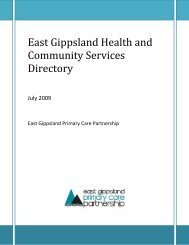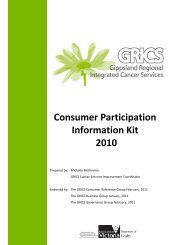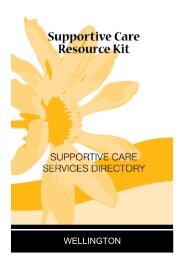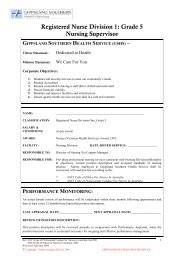7-Children And Grief - GHA Central
7-Children And Grief - GHA Central
7-Children And Grief - GHA Central
You also want an ePaper? Increase the reach of your titles
YUMPU automatically turns print PDFs into web optimized ePapers that Google loves.
<strong>Children</strong> and <strong>Grief</strong><br />
Information for Parents and<br />
Caregivers<br />
One of the most<br />
difficult pieces of<br />
this journey is that<br />
not everyone in a<br />
family will grieve in<br />
the same way.<br />
<strong>Children</strong> and teens<br />
grieve in ways that<br />
reflect their<br />
developmental<br />
understanding,<br />
previous<br />
experience with<br />
loss and the<br />
support and<br />
information<br />
available to them.<br />
Read more about<br />
the following ages.<br />
------------------------<br />
• <strong>Children</strong> Aged 3 to 5<br />
• <strong>Children</strong> Aged 6 to 8<br />
• <strong>Children</strong> Aged 9 to 11<br />
• Young Adolescents<br />
Aged 12 to 14<br />
• Older Adolescents<br />
Aged 15 to 17<br />
<strong>Grief</strong> in a family with children and teens is both rewarding<br />
and painful. Together you will discover what hurts and<br />
what helps as you journey through the death of a family<br />
member and your bereavement. Since it is possible that<br />
your child's understanding and needs may not fit within<br />
his or her particular age group, it may be helpful to read<br />
the information for children older and younger than your<br />
own.<br />
One of the most difficult pieces of this journey is that not<br />
everyone in a family will grieve in the same way. <strong>Children</strong><br />
and teens grieve in ways that reflect their developmental<br />
understanding, previous experience with loss and the<br />
support and information available to them. Remember<br />
that your children are learning from you so include them<br />
in your grief process. Show and tell them how you are<br />
feeling and what you do with your grief. This helps them<br />
to understand their feelings and how to express them.<br />
<strong>Children</strong> Aged 3 to 5<br />
DEVELOPMENTAL INFORMATION<br />
At this age children think in magical, selfcentred,<br />
physical and connected ways.<br />
<strong>Children</strong> of this age will see themselves as the centre of<br />
most things they experience. They believe that their<br />
thoughts and behaviours are the cause of events, and<br />
that things that happen at or close to the same time are<br />
related. For example, your child may believe if, in a fit of<br />
anger, she wished you dead and then you became sick,<br />
that she ‘caused’ your illness to happen. Unfortunately,<br />
when a child of this age gets such an idea as this it is<br />
very difficult for her to revise her thinking. If you sense<br />
that this has happened, you will need to help your child<br />
understand that nothing she said, did or felt caused the<br />
illness or death. Often it is necessary to reassure your<br />
child more than once that she is not to blame for what<br />
has happened.
In terms of how children aged 3 to 5 feel,<br />
there are two things to remember; they<br />
are anxious when separated from<br />
parents or primary caregivers and they<br />
are distressed by expressions of<br />
powerful emotion from adults. At this age<br />
children will feel scared and responsible<br />
when they see a parent or other<br />
significant adult in distress (e.g.,<br />
prolonged tears, loud sobbing or<br />
slamming of doors). For example, you<br />
might be driving with your children and<br />
unexpectedly be overcome with the rage<br />
and sadness that you feel about your<br />
father’s sudden death. These strong<br />
feelings might affect your interactions<br />
with your children and you might find<br />
yourself crying and yelling at them about<br />
something minor. If this sort of thing<br />
happens it is important that your children<br />
see you recover from your emotion and<br />
that you carefully and calmly explain to<br />
them what you were feeling and why.<br />
<strong>Children</strong> of this age tend to have little contact with systems outside the<br />
family.<br />
Relatives and perhaps daycare or<br />
preschool staff are often the child’s only<br />
contact with the world outside your<br />
family. When someone in the family is ill,<br />
this often means that your child will visit<br />
a number of new places (hospitals) and<br />
meet new people such as doctors and<br />
nurses. There are books and toys that<br />
you can use to help your child become<br />
familiar with these new situations.<br />
WHEN SOMEONE IS VERY ILL<br />
Tell your child about changes in the person who is ill, and that they are<br />
caused by the disease and its treatments.<br />
Use clear simple words and go over this<br />
as often as new changes happen.<br />
<strong>Children</strong> of this age benefit from clear<br />
honest information given on a regular<br />
basis that can help them to understand<br />
what they are seeing and hearing as<br />
their family member changes. For<br />
example, on your next visit to the<br />
hospital you might show her a<br />
wheelchair or an electric bed and<br />
demonstrate to her when they are used<br />
and how. When you talk about the sick<br />
person or the illness with your child,<br />
focus on the things that she will actually<br />
see (e.g., medicines, weight loss, hair<br />
loss, equipment) and hear (e.g.,<br />
breathing changes, crying, common<br />
words, such as chemo or cancer).<br />
Respect that your child cannot witness<br />
intense feelings for more than a brief<br />
time. If your child sees that you are very<br />
upset he will think that he is the cause of<br />
your grief so, careful frequent<br />
explanations are necessary. It is<br />
common for adults to want to protect<br />
children from intense displays of<br />
emotion. However, sometimes this<br />
expectation is unrealistic. For example,<br />
you may need to tell your son that his<br />
mom is going to die, but you can’t even<br />
think about it without being overcome<br />
with tears. If this is your situation you
may ask a trusted friend or hospice<br />
counsellor to explain this to him with you<br />
present. Talk together ahead of time so<br />
that this person understands your needs<br />
and exactly what you would like your son<br />
to know.<br />
Talk with the person who is ill about the length and frequency of visits with<br />
your child.<br />
Sometimes the excitement and energy of<br />
a young child may be tiring or<br />
overwhelming. Plan for your child to<br />
have something interesting to do during<br />
the visit. It is a good idea to take quiet<br />
toys or other simple activities that she<br />
can play with or show to the person that<br />
you’re visiting. For example, she might<br />
draw pictures or make a card for the<br />
person while you’re there. Don’t visit<br />
during regular nap times. Often a visit<br />
over your child’s favorite take-out lunch<br />
or dinner is a comfortable way to spend<br />
time together. Be prepared to leave<br />
when she shows you, through her mood<br />
or behaviour, that she is ready to go. If<br />
you would like to stay longer than your<br />
child can manage, arrange to have a<br />
favourite person come and take her<br />
home.<br />
Make a regular time and place when your child can ask questions and<br />
share his feelings and thoughts about what’s happening.<br />
When someone that you love is seriously<br />
ill it can be difficult to find time to talk<br />
about it with your children. Many adults<br />
hope that if their children aren’t showing<br />
any upset that they’re OK. However,<br />
even though children of this age are very<br />
aware of what is going on with you, they<br />
often do not have the words needed to<br />
let adults know about their feelings and<br />
questions. You will need to make time<br />
for these conversations with your child.<br />
For example, you might find that<br />
bedtime, when you can snuggle up<br />
together, is a good time to check out<br />
how he is doing. Or you might choose<br />
mealtimes or car rides for these talks.<br />
WHEN SOMEONE HAS DIED<br />
Use concrete specific details to explain to your child that the person has<br />
died.<br />
It is helpful to clarify that when someone<br />
dies their heart doesn’t beat, their ears<br />
don’t hear, their body doesn’t move, etc.,<br />
and that the person cannot feel anything<br />
anymore. The characters and heroes of<br />
cartoons and movies aimed at children<br />
of this age often magically come back to<br />
life and this unfortunately reinforces their<br />
false and magical beliefs about death.<br />
Consequently, it may be difficult for your<br />
children to understand the permanence<br />
of death. You will likely need to explain<br />
and affirm frequently that the person who<br />
died will not be coming back to life. It<br />
may be helpful to recall a past loss that<br />
she will remember such as the death of<br />
a pet or another person to demonstrate<br />
that dead people don’t come back. If you
are able to remain calm it may be helpful<br />
for you to allow her to see the person<br />
after death because it would help her to<br />
understand in a very concrete way that<br />
when someone dies their body stops<br />
working completely.<br />
Prepare your child for any rituals that will take place after the death.<br />
Before attending the funeral or memorial<br />
service explain to your child what will<br />
happen, who will be there, how people<br />
will be and what role, if any, he will have.<br />
Remember that children need concrete<br />
information and will be frightened by<br />
intense emotion. For example, if you and<br />
your son will be attending the funeral of<br />
a much loved uncle you might tell him<br />
that many of his uncle’s friends will be<br />
there and that some people, including<br />
yourself, will probably be crying because<br />
they are sad that he has died. If it is an<br />
open coffin service you might explain<br />
that his uncle’s body will be there so that<br />
people can say goodbye to him and that<br />
the coffin is used to bury his uncle in the<br />
ground. Ensure that you or another<br />
person will be free to take him home if<br />
he wishes and be sure that he knows<br />
who that person will be.<br />
Provide your child with frequent opportunities to think and talk about the<br />
person who died.<br />
When there has been a death in the<br />
family, children will need to talk about<br />
what happened long after the death and<br />
initial grieving period. <strong>Children</strong> look to<br />
parents and caregivers for guidance<br />
about how to grieve and if you don’t talk<br />
about your loss it is unlikely that your<br />
child will. If you continue to talk about the<br />
person who died and how you are both<br />
coping it will help your child to<br />
understand and accept the loss. For<br />
example, if you both openly talk about<br />
the person who died, sharing memories<br />
and feelings, she will know that she is<br />
not responsible for the sadness that you<br />
both feel.<br />
Give your child access to objects that<br />
foster an ongoing sense of connection to<br />
the person who died. <strong>Children</strong> at this<br />
age will long for the person who died and<br />
want them to come back. Resist the<br />
impulse to put away all the pictures and<br />
other reminders of the person who died.<br />
Keep objects or photographs of the<br />
person who died accessible to your<br />
child, as these are often a source of<br />
comfort and pleasure. For example, if<br />
your son’s beloved grandpa died, he<br />
may want to keep a special picture of<br />
him in his room and wear his slippers. It<br />
might also be especially important on<br />
birthdays or special holidays to find a<br />
way to remember grandpa. Find out<br />
what helps your child feel connected to<br />
the person he grieves for.<br />
Remember that your child’s grieving process will differ radically from your<br />
own.<br />
<strong>Children</strong> of this age live in the moment.<br />
They don’t realize the full extent of the<br />
loss and will be uncomfortable with long<br />
intense displays of emotion. They will
grieve sporadically with intense brief<br />
bursts over many years. For example,<br />
your daughter may be inconsolable<br />
about her father’s death one moment<br />
and happily playing the next. When this<br />
happens accept that this is normal and<br />
that she will have feelings and questions<br />
about this loss throughout her lifetime.<br />
SUGGESTED READING<br />
Books for children<br />
Lifetimes. R. Ingpen & M. Bryan. (1987).<br />
A simple story about beginnings and<br />
endings in the lifetimes of plants,<br />
animals and people.<br />
My Many Colored Days. Dr. Seuss.<br />
(1998). A useful book to help adults talk<br />
to children about emotions.<br />
When Dinosaurs Die: A guide to<br />
understanding death. L. Krasny Brown.<br />
(1996). Engaging book that has straight<br />
forward questions and answers about<br />
death.<br />
Old Turtle. D. Wood (1992). A beautiful<br />
story that may help with questions about<br />
spirituality, nature and God.<br />
Books for Parents<br />
How Do We Tell the <strong>Children</strong>? A step by<br />
step guide for helping children two to<br />
teen cope when someone dies. D.<br />
Schaefer & C. Lyons. (1993). Helpful<br />
book for parents and professionals about<br />
communication with children of various<br />
ages on the topic of death and dying.<br />
Helping <strong>Children</strong> Cope with the Loss of a<br />
Loved One. A guide for grownups. W.<br />
Kroen & P. Espeland (Ed.). (1996). This<br />
book is helpful for parents and<br />
professionals and was winner of 1996<br />
Parents’ Award for Excellence. The<br />
advice and information cover the<br />
experiences of children from infancy<br />
through to age eighteen.<br />
The Grieving Child. A parent’s guide. H.<br />
Fitzgerald. (1992). Easy to read book for<br />
parents with many tips and<br />
recommendations about ways to support<br />
grieving children at any age.<br />
Healing <strong>Children</strong>’s <strong>Grief</strong>. Surviving a<br />
Parent’s Death from Cancer. G. Hyslop<br />
Christ. (2000). Book based on research<br />
with eighty-eight families over the course<br />
of a parent’s terminal cancer diagnosis,<br />
the death and the bereavement. May be<br />
too wordy for some grieving parents<br />
though an excellent resource on the<br />
ages, developmental strengths and<br />
needs of children as they face the death<br />
of a parent.
DEVELOPMENTAL INFORMATION<br />
<strong>Children</strong> Aged 6 to 8<br />
Between 6 and 8 years of age children are changing in the ways that they<br />
think.<br />
Some children of this age are able to<br />
understand cause and effect and most<br />
will still think in the egocentric and<br />
magical ways of younger children. When<br />
someone in the family has died there is<br />
often tension, conflict, sadness, and<br />
anger in other family members. Young<br />
children naturally will detect these<br />
feelings, even if you think that you are<br />
hiding them. When you don’t explain to<br />
your child that these normal feelings are<br />
about the loss, he may think that he is<br />
the reason for the family’s distress. If this<br />
happens it is important that you talk to<br />
your child immediately about what you<br />
felt and why. At this age drawings, short<br />
stories and play may be ways to help<br />
your child understand why the illness or<br />
death has occurred. Use simple honest<br />
language. Avoid terms that your child<br />
may not clearly understand, such as<br />
‘terminally ill’ or ‘passed on’.<br />
<strong>Children</strong> of this age usually feel free to express their emotions.<br />
Different from younger children, 6 to 8<br />
year olds may remain fixated on the<br />
illness or death of a family member and<br />
can be easily overwhelmed by their own<br />
emotions. The sadness, anger, anxiety<br />
or guilt that they might feel about a<br />
family member’s illness usually shows<br />
up as a change or increase in their<br />
normal behaviour. For example, you<br />
might notice that your generally<br />
confident child is now anxious and<br />
resistant, with tears and tummy aches,<br />
when you take her to school each day.<br />
When this happens, talk to her teacher<br />
and principal about helping your child<br />
express her feelings and feel safe when<br />
you are not available. It is common for<br />
children of this age to feel rejected and<br />
unloved if you take time and energy<br />
away from them to care for an ill family<br />
member. Since this may be unavoidable,<br />
it is important that at some point each<br />
day your child can have special time<br />
alone with you and regularly explain why<br />
you are leaving her.<br />
Although children of this age usually<br />
have made connections with school and<br />
other children, they are not self-sufficient<br />
and still need reassurance from parents<br />
and other significant adults about their<br />
importance and safety in the world.<br />
When parents are distracted with caring<br />
for others or grieving, the child’s basic<br />
needs for nurturing and encouragement<br />
can be overlooked, and this may result in<br />
the child feeling rejected or frightened.<br />
During these times the continuation of<br />
your child’s usual routines and the<br />
company of other caring adults may be<br />
helpful.
WHEN SOMEONE IS VERY ILL<br />
Tell your child about the disease, including its symptoms, treatment and<br />
what is likely to happen.<br />
When you talk about this with your child<br />
it is important that you use the correct<br />
name of the disease and that you clearly<br />
explain what causes it and how it affects<br />
the person who is ill. Talk about the<br />
things that your child might see (e.g.<br />
weight loss, changes in the person’s skin<br />
colour, hair loss,) and hear (e.g.<br />
coughing, confusion, people awake at<br />
night) and whether the person will get<br />
well or not. It will be necessary for you to<br />
go over this information again as things<br />
change and to be honest with your child<br />
about what the changes mean. For<br />
example, you might say to your son that<br />
his auntie has cancer and the doctors<br />
aren’t able to make it go away. You<br />
could tell him that the cancer is growing<br />
too big for her to get better and that this<br />
means that she will die. You might also<br />
explain to him that before she dies she<br />
may stop eating and be too tired to stay<br />
awake when he visits with her. Since<br />
many children of this age will avoid<br />
asking questions out of fear of upsetting<br />
others or making the situation worse, it is<br />
important that you start and continue<br />
these frank discussions throughout the<br />
illness.<br />
Demonstrate to your child that you love her and that you will be there for<br />
her.<br />
At this age children look to their parents<br />
for their self-worth and safety. When you<br />
are not often free to play with your child<br />
and most of your times with her are<br />
affected by the despair and exhaustion<br />
that you feel about a family member’s<br />
terminal condition, she may become<br />
insecure and resentful. Often these<br />
feelings show up as withdrawn, angry or<br />
babyish behavior. For example, your<br />
child might stop speaking to you for a<br />
while or get into fights at school with her<br />
peers. When this happens, it will be<br />
important that you respond with love and<br />
understanding, as well as reasonable<br />
consequences.<br />
Find one or two other caregivers who are trustworthy and can regularly<br />
take care of your child when you must be elsewhere.<br />
When you are looking for alternate<br />
caregivers, think about who your child<br />
feels happiest and most comfortable<br />
with. It is important that these people are<br />
honest and open with him about your<br />
family member’s illness in the same way<br />
that you are. If the people that you<br />
choose are uncomfortable discussing the<br />
illness with him, you could provide them<br />
with any information that you have found<br />
particularly helpful. Also, it may be<br />
possible that a counsellor who is working<br />
with your family could meet with you and<br />
the caregivers and suggest ways that<br />
you might all work together to support<br />
your child through his grief process.
Talk to teachers and other significant adults such as coaches and group<br />
leaders.<br />
These adults are part of your child’s<br />
social world and their care and<br />
understanding will help your child to<br />
manage the awkward moments,<br />
impossible questions and intense<br />
emotions that may lie ahead. Let these<br />
people know that there may be a<br />
temporary drop or change in your child’s<br />
performance, enthusiasm and/or<br />
concentration. Let them know that this<br />
kind of change is normal and provide<br />
them with resources, such as brochures,<br />
books or videos that may help them<br />
support your child during this difficult<br />
time.<br />
WHEN SOMEONE HAS DIED<br />
Tell your child promptly about the death.<br />
If your child was not present at the time<br />
of death, soon after the death has<br />
occurred, tell her what has happened.<br />
When you tell her that this person has<br />
died, explain that the person’s bodily<br />
functions have all stopped (e.g.<br />
heartbeat, breathing, movement) and<br />
that he or she can no longer see, hear,<br />
eat or feel. State clearly to your child that<br />
the person will not come back to life and<br />
avoid using phrases such as ‘gone to a<br />
better place’ or ‘with the angels’ and<br />
comparisons that associate death with<br />
sleep. These common euphemisms and<br />
comparisons confuse the magical and<br />
concrete thinking of children at this age.<br />
Your child may misunderstand what you<br />
mean and become fearful. For example,<br />
instead of telling your daughter that<br />
grandma has passed away, you would<br />
say that she has died and that you knew<br />
grandma had died because she stopped<br />
breathing.<br />
Encourage and prepare your child to attend family rituals that will happen<br />
after the death.<br />
If there is to be any funeral or memorial<br />
service, begin to prepare him for what to<br />
expect when he is there. Be sure that he<br />
knows what will happen, who will be<br />
there, what he will be doing at the<br />
service, and if the body of the person<br />
who died will be there. Ask a special<br />
person to be available to the child if he<br />
needs support and you may be unable to<br />
provide it. If your child has a close<br />
relationship with other adults such as a<br />
teacher or coach it can be helpful if<br />
those people can attend the service.<br />
Whether your child attends the funeral or<br />
not, he might want to make a letter or<br />
drawing to place into the coffin as his<br />
personal goodbye to the person who has<br />
died.<br />
Anticipate that your child may be<br />
concerned about her health and the<br />
health of the significant adults in her life<br />
after a death. After a death in the family,<br />
children often become quite curious and<br />
concerned about death. Your child may
e constantly asking questions about<br />
whether or when different people in her<br />
life will die. She will likely also be<br />
concerned about the possibility of her<br />
own and your death. Often this kind of<br />
fear shows up in your child’s body. For<br />
example, she may complain of having<br />
similar symptoms to the person who<br />
died, such as headaches or tummy<br />
aches. If your child complains in this way<br />
she needs your loving attention, patience<br />
and understanding. Reassure her that<br />
you both are healthy by explaining in<br />
simple ways that you and she do not<br />
have what the person who died had. In<br />
the event that this is an hereditary illness<br />
that either you or she may get, it will be<br />
important to clearly explain this<br />
possibility, although now may not be the<br />
right time.<br />
Expect that your child will be concerned about what would happen to him<br />
if his surviving parent(s) became ill and died.<br />
When a significant adult dies, your child<br />
will be more concerned that you may die.<br />
It is important that you explain to your<br />
child what would happen to him if you<br />
were to become ill and die. For example,<br />
you need to talk to him about whom you<br />
have named as his guardians and what<br />
those guardians would do for him in the<br />
event of your illness or death.<br />
Understand that it is normal for your child to express grief in brief bursts<br />
quickly followed by happier activities.<br />
Your child’s grief will likely happen in<br />
sudden outbursts of sadness, anger,<br />
guilt or fear. When this happens, allow<br />
your child to feel her feelings and help<br />
her to find reasonable or safe ways to<br />
express them. For example, if she is<br />
showing a lot of anger, you and she<br />
might play soccer or tag together. If she<br />
is sad, you might spend some time<br />
talking about the person who died or<br />
looking at photographs together. These<br />
moments may be especially difficult for<br />
you to get through because your own<br />
grief will be triggered. Be sure that you<br />
are allowing yourself the time and space<br />
to grieve so that you are able to support<br />
your child as she grieves. You will also<br />
need to find ways to express and share<br />
your emotions and questions with adults<br />
who can understand your pain.<br />
Ask for the support of key adults in the child’s life such as teachers,<br />
principal, coach or group leader.<br />
<strong>Children</strong> of this age are beginning to look<br />
to other adults as well as parents to<br />
provide them with a sense of well-being,<br />
self-esteem and security. Be sure that<br />
these key people understand grief and<br />
are comfortable with it so that they can<br />
help your child deal with the<br />
awkwardness and curiosity of other<br />
children and adults.
SUGGESTED READING<br />
Books for children<br />
Badger’s Parting Gifts. S. Varley. (1992).<br />
A badger dies after a long life. His<br />
friends are sad, but remember the things<br />
he taught them.<br />
The Tenth Good Thing about Barney. J.<br />
Viorst. (1976). When his cat dies, a boy<br />
tries to remember ten good things about<br />
him.<br />
Gran-Gran’s Best Trick. A story for<br />
children who have lost someone they<br />
Books for parents<br />
How Do We Tell the <strong>Children</strong>? A step by<br />
step guide for helping children two to<br />
teen cope when someone dies. D.<br />
Schaefer & C. Lyons. (1993). Helpful<br />
book for parents and professionals about<br />
age-appropriate communication with<br />
children on the topic of death and dying.<br />
Helping <strong>Children</strong> Cope with the Loss of a<br />
Loved One. A guide for grownups. W.<br />
Kroen & P. Espeland (Ed.). (1996). This<br />
book is helpful for parents and<br />
professionals and was winner of 1996<br />
Parents’ Award for Excellence. The<br />
advice and information cover the<br />
experiences of children from infancy<br />
through to age eighteen.<br />
love. L. Holden. (1989). A boy’s<br />
grandfather gets cancer and the boy<br />
grieves while his grandpa is dying and<br />
remembers their close relationship.<br />
Vanishing Cookies. Doing OK when a<br />
parent has cancer. M. Goodman. (1991).<br />
A story about a child’s concerns and<br />
needs when someone in the family has<br />
cancer.<br />
The Grieving child. A parent’s guide. H.<br />
Fitzgerald. (1992). Easy to read book for<br />
parents with many tips and<br />
recommendations about ways to support<br />
grieving children at any age.<br />
Healing <strong>Children</strong>’s <strong>Grief</strong>. Surviving a<br />
Parent’s Death from Cancer. G. Hyslop<br />
Christ. (2000). May be too wordy for<br />
some grieving parents though an<br />
excellent resource on the ages,<br />
developmental strengths and needs of<br />
children as they face the death of a<br />
parent.
<strong>Children</strong> Aged 9 to 11<br />
DEVELOPMENTAL INFORMATION<br />
At this age children are becoming more capable of concrete operational<br />
thinking.<br />
This means that children of this age are<br />
on a quest to gain knowledge and<br />
understand events, so they have many<br />
questions (often ‘why’ questions) and a<br />
need for detailed information about<br />
terminal illness and death. They use<br />
logic in their thinking and are sometimes<br />
able to modify inaccurate conclusions<br />
that they have previously formed. For<br />
example, to begin with your child may<br />
wish that a dead loved one would ‘come<br />
back to life’ (which is like a younger<br />
child’s more ‘magical’ thinking) but also<br />
be able to change this thinking, when<br />
things are explained, to understand that<br />
coming back to life is not possible.<br />
Although children of this age definitely<br />
have feelings about a loved one being ill,<br />
they don’t easily talk about these<br />
feelings or express them to others.<br />
<strong>Children</strong> are beginning to rely on their<br />
new ability for logic and think through<br />
their feelings as well as feeling them.<br />
This helps them contain powerful<br />
emotions that may be overwhelming for<br />
them. For example, if your child has<br />
been told that someone is going to die,<br />
and she is feeling sad or fearful about it,<br />
she may ask you questions such as<br />
“does it hurt”, “what does it look like”, or<br />
“when will it happen” as well as<br />
expressing her sadness or fear. It is<br />
important to remember that children who<br />
have been excluded from earlier<br />
discussions about the illness may not<br />
feel comfortable talking about their<br />
concerns now. It is common for children<br />
who have not been given enough<br />
information to feel anger, anxiety and<br />
mistrust. Find ways to speak with your<br />
child often, openly and plainly about<br />
illness, dying, death and grief.<br />
At this age children are increasingly involved in activities and relationships<br />
outside of their homes and families.<br />
Their classmates, teammates and<br />
friends take on new importance. They<br />
spend a significant amount of time with<br />
friends, sharing common interests and<br />
social experiences. However, they don’t<br />
tend to talk about or look to one another<br />
for support about things like illness or<br />
death. For example, your child is unlikely<br />
to turn to a friend for answers to his<br />
questions about dying. However doing<br />
things with friends is a major part of how<br />
children cope with stress, illness, and<br />
death. It provides your child with a nonthreatening<br />
and natural outlet for pent-up<br />
emotions in a way that gives him a<br />
sense of control and competence.
WHEN SOMEONE IS VERY ILL<br />
Give your child information when the<br />
disease is diagnosed and let her know<br />
about each new change in the illness.<br />
The information should include the name<br />
of the disease, any known causes and<br />
treatments. Your child will be more<br />
comfortable when she’s included.<br />
Explain any changes in the sick person’s<br />
behavior or the family’s routines as a<br />
result of the disease or its treatment. For<br />
example, if the sick person will lose her<br />
hair and throw up a lot from<br />
chemotherapy, it would helpful to explain<br />
ahead of time to your child that these are<br />
normal side effects. Give basic<br />
information regularly (as it is known) to<br />
help her identify and express her<br />
feelings and thoughts before the shock<br />
of imminent death.<br />
Explore your child’s interest in visiting and helping the person whois ill.<br />
Your child may have a natural curiosity<br />
about the person who is ill, wanting (and<br />
fearing) to know what the ill person looks<br />
like and what’s happening with him or<br />
her. He might like to visit and even help<br />
the sick person. Once you are sure that<br />
your child wants to visit, consider<br />
whether he would like to do anything for<br />
the person when you are visiting. For<br />
example, although it would not be safe<br />
for him to be left alone to take care of the<br />
ill person, he might help to prepare a<br />
meal or make a tape of the person’s<br />
favorite music. Be sensible and creative<br />
when thinking about things that are<br />
reasonable for a child of his age to do.<br />
When he visits, be sure that he<br />
understands that his visit might be<br />
shorter than he hopes because the dying<br />
person may be too tired or unwell.<br />
Be aware of any alliances or conflicts that your child has with the person<br />
who is dying.<br />
It is important to think carefully about<br />
how your child feels about the person<br />
who is dying and how the dying person<br />
feels about her. Are they best friends?<br />
Does you child go to him or her<br />
whenever something is hurting or needs<br />
fixing? Is their relationship difficult? Do<br />
they argue often? Does your child relate<br />
to the dying person because they are<br />
alike or different? Thinking about these<br />
questions will help you to understand<br />
what will be lost and where the gaps will<br />
be for your child after this person dies. It<br />
is important to acknowledge the<br />
uniqueness of their relationship and be<br />
willing to identify any negative aspects of<br />
it that your child may struggle with.<br />
Allow your child to remain involved in regular after-school activities, sports<br />
and visits with friends.<br />
Remember that your child is at an age when these activities are vitally important.<br />
Developing activities, interests and friendships outside of the home and family help
the child to build healthy self-esteem and an extended support network. Try to<br />
maintain usual after-school routines and make play time with friends a priority.<br />
Educate and update the significant adults in the child’s life.<br />
Since children of this age may be<br />
unlikely to initiate discussions with adults<br />
about the disease or its progression, you<br />
might encourage other adults to bring it<br />
up. For example, you might provide them<br />
with information that you have found<br />
informative and give them permission to<br />
raise the topic if it feels appropriate.<br />
Also, your child may be encouraged to<br />
know that these adults have lived<br />
through losses and to hear what they felt<br />
or learned.<br />
WHEN SOMEONE HAS DIED<br />
Encourage your child to participate in family rituals after the death.<br />
Explain the purpose of these rituals and<br />
invite him to take part in any planning or<br />
preparation. Talk with him about the<br />
possible duties he might wish to have<br />
such helping to write the obituary or<br />
helping to seat guests at the funeral. You<br />
might consider whether he’d like to<br />
contribute his thoughts or feelings to a<br />
speech given at the service or other<br />
gathering. For example, he might like to<br />
make a list of his favorite memories or<br />
the things he liked most about the<br />
person who died. Find out if he would<br />
like any friends to be at the ceremony<br />
and help him extend these invitations.<br />
Return to the family’s former routines and prepare your child for any<br />
necessary changes in these routines.<br />
After a death, family life is different.<br />
Usual eating, sleeping and living routines<br />
will be in disorder for a while and some<br />
may be permanently changed. This state<br />
of confusion will be difficult for your child<br />
so it is important for you to continue the<br />
routines that help her to feel secure and<br />
looked after. For example, continue with<br />
normal bed and meal times, and getting<br />
your child to school, even though you<br />
and she may not feel like it. Family<br />
meetings can provide you with a chance<br />
to bring out and talk about any upcoming<br />
changes or brewing issues; if your family<br />
doesn’t presently have them, now may<br />
be a good time to begin.<br />
Be aware that your child may not know<br />
how to grieve. This may be your child’s<br />
first experience of a death and he will<br />
look to you for guidance about what to<br />
do with the many reactions, feelings, and<br />
questions that surface as part of his<br />
grief. This doesn’t mean you need to be<br />
the perfect model of grief, but<br />
understand that how you grieve will<br />
strongly influence how your child<br />
grieves. For example, if you leave the<br />
room whenever you cry, your child will<br />
learn that he must not cry in front of<br />
other people. Even though most children<br />
this age can only stand brief displays of<br />
emotion (whether their own or another
person’s) it is important that the adults<br />
around them model healthy ways to<br />
express common emotions.<br />
Spontaneous, controlled moments of<br />
crying will help your child to see that<br />
expressing and sharing emotions is<br />
normal. To help your child express her<br />
grief, it may be helpful to look at family<br />
photograph albums or visit the cemetery<br />
together.<br />
When a parent has died, expect changes<br />
in your child’s behavior. A child whose<br />
parent has died will be full of emotions,<br />
particularly fear, guilt and sadness. One<br />
way your child copes with these intense<br />
feelings is to act them out. A grieving<br />
child may become unmanageable and<br />
demanding. For example, this can show<br />
up as frequent sulking, clinging or<br />
misbehavior. Be aware that these<br />
difficult behaviours tend to be most<br />
extreme at home and directed at you as<br />
the remaining parent or caregiver. If the<br />
parent who died was the main<br />
disciplinarian it will be important that you<br />
quickly develop your own way of<br />
maintaining order and respect in the<br />
family. If you are at a loss about how to<br />
do this, ask other parents that you<br />
respect, or teachers, coaches and<br />
school counsellors for help. Also, there<br />
are agencies in most communities that<br />
offer parenting support or information<br />
classes.<br />
SUGGESTED READING<br />
Books for children<br />
Charlotte’s Web. E.B. White. (1999). A<br />
story of love, friendship, seasons,<br />
change and death between a young girl,<br />
a pig, and a spider.<br />
The Education of Little Tree. F. Carter &<br />
R. Strickland. (1986). A chapter book<br />
about a young orphaned Cherokee boy<br />
who goes to live with his grandparents.<br />
Books for Parents<br />
How Do We Tell the <strong>Children</strong>? A step by<br />
step guide for helping children two to<br />
teen cope when someone dies. D.<br />
Schaefer & C. Lyons. (1993). Helpful<br />
book for parents and professionals about<br />
age-appropriate communication with<br />
children on the topic of death and dying.<br />
Helping <strong>Children</strong> Cope with the Loss of a<br />
Loved One. A guide for grownups. W.<br />
Kroen & P. Espeland (Ed.). (1996). This<br />
Full of love, compassion, sadness and<br />
hope.<br />
Zebra: <strong>And</strong> Other Stories. C. Potok.<br />
(2000). Short stories written for young<br />
people facing coming of age milestones<br />
such a peer pressure, grief, divorce and<br />
finding hope.<br />
book is helpful for parents and<br />
professionals and was winner of 1996<br />
Parents’ Award for Excellence. The<br />
advice and information cover the<br />
experiences of children from infancy<br />
through to age eighteen.<br />
The Grieving Child. A parent’s guide. H.<br />
Fitzgerald. (1992). An easy to read book<br />
for parents with many tips and
ecommendations about ways to support<br />
grieving children at any age.<br />
Healing <strong>Children</strong>’s <strong>Grief</strong>. Surviving a<br />
Parent’s Death from Cancer. G. Hyslop<br />
Christ. (2000). Book based on research<br />
with 88 families over the course of a<br />
parent’s terminal cancer diagnosis, the<br />
death and the bereavement. May be too<br />
wordy for grieving parents though an<br />
excellent resource on the ages,<br />
developmental strengths and needs of<br />
children as they face the death of a<br />
parent.<br />
Young Adolescents Aged 12 to 14<br />
DEVELOPMENTAL INFORMATION<br />
Young adolescents are entering into the cognitive stage known as formal<br />
operational thought.<br />
This means that they are beginning to<br />
understand more fully the realities of<br />
dying and death. This growing<br />
comprehension means that teens will go<br />
through the death of someone they love<br />
with insight, compassion and conflict. As<br />
a defense against the reality of death,<br />
they will often refuse to accept that<br />
someone is dying and may insist that the<br />
person will get better or that family and<br />
doctors not ‘give up’. For example, when<br />
you tell your daughter that her mother is<br />
expected to die, she may react with<br />
outrage at your lack of hope and<br />
demand that you get the doctors to do<br />
something more. At this age, hope and<br />
denial work together to help her cope<br />
with the intensity of her emotional<br />
responses to the devastating news. It is<br />
important for you to remember that<br />
although your teen will think she knows<br />
all that there is to know, this is not going<br />
to be true if you are unable to find ways<br />
to talk to each other.<br />
Since young teens are beginning to<br />
understand how much will be lost or<br />
changed when someone dies, they<br />
experience powerful feelings of sadness,<br />
anger, guilt, fear and fierce hope.<br />
Adolescence is normally a time of<br />
emotional extremes and the stress of a<br />
terminal illness in the family is likely to<br />
exaggerate these extremes. Typically<br />
teens are overwhelmed, threatened and<br />
embarrassed by their own and other<br />
people’s strong feelings and will prefer to<br />
be alone to express them. For example,<br />
when a young teen is told that his best<br />
friend has died he might erupt with<br />
intense anger, storm out of the room,<br />
refuse to come out of his bedroom, and<br />
not talk to anyone (or any adults) for<br />
several hours. Allow your teenager the<br />
time and space he needs to take in<br />
important information. Be respectful of<br />
his need for privacy but continue to<br />
check in with him about his needs for<br />
support or information.<br />
Although young teens must begin to<br />
push for their independence and<br />
freedom with parents, they will often feel<br />
rejected and abandoned if they believe<br />
that their parents are withdrawing. Even<br />
though your teens may not want to be at
home or with you, they will need a lot of<br />
reassurance that you still love and care<br />
about them. For example, when<br />
someone is ill you may spend a lot of<br />
time away from home or be keeping<br />
things to yourself assuming that since<br />
your teen is not around, she doesn’t<br />
need you or isn’t interested. However, it<br />
is possible that she will think your<br />
absence means that you don’t care<br />
about her or the goings on of her life. It is<br />
also important that you are very clear<br />
about your expectations and that you<br />
identify what isn’t negotiable and also<br />
that you are clear about the choices that<br />
she does have. Find ways to share time<br />
with your teen that help her to be secure<br />
about your love and interest in her.<br />
WHEN SOMEONE IS VERY ILL<br />
Give your teen information in a formal detailed way.<br />
Even though you are likely to meet<br />
resistance, it is important that you give<br />
your teen correct up to date information.<br />
Since his first priority may not be family,<br />
it is important that you give him enough<br />
information to make choices about when<br />
and how he wants to spend his time.<br />
Because a teen of this age may want to<br />
avoid emotional discussions, it is<br />
important that he understands why he<br />
needs to hear what you have to say and<br />
that you keep calm as you say it. If, for<br />
example, you know that you are too<br />
upset to speak calmly and clearly, you<br />
might ask the doctor or a friend to<br />
explain things to him. Remember that<br />
teens of this age will not seek out<br />
information about illness and dying. He<br />
may not know what is happening even<br />
when he leads you to think that he does.<br />
Help your teen to decide when and if she wants to visit the person who is<br />
dying.<br />
Let your teen know when death is<br />
expected and be as specific as possible<br />
about the changes that you are seeing.<br />
For example, describe how the person<br />
has changed since her last visit, what<br />
she might notice this time, and whether<br />
death is hours, days or minutes away.<br />
The intense emotion that anticipating a<br />
final visit triggers may be very upsetting<br />
for a young teen, and she may choose<br />
not to visit but to remember the dying<br />
person as he or she was before the<br />
illness. Once your daughter has made<br />
her decision, be supportive. For<br />
example, if she decides not to go, you<br />
might suggest that she could write a note<br />
instead and you could read it to the<br />
person when you visit. It will be<br />
important to let her know that even<br />
though she doesn’t visit, the dying<br />
person accepts her choice, feels her love<br />
and that you both accept her reasons for<br />
not going. If possible, give her a way to<br />
change her mind.
Talk with your teen and ask about his feelings and concerns.<br />
Although these conversations may be<br />
awkward, unwelcome or infrequent it is<br />
important that you make them happen.<br />
He may fear rejection by his friends if he<br />
speaks about his upcoming loss and be<br />
holding his true feelings inside. Don’t be<br />
misled by your son’s apparent lack of<br />
concern and think that he is unaffected<br />
by the situation. For example, you might<br />
think that since he is keeping up his<br />
grades and not sad at home that he is all<br />
right. However, it is more likely that he<br />
finds that schoolwork provides him with<br />
relief from the intensity of his feelings<br />
and family life. If you sense that this may<br />
be happening let him know that you are<br />
interested in how he’s managing. If you<br />
don’t feel comfortable doing this or he<br />
refuses to talk with you, you might ask<br />
him if there is someone else that he<br />
would be comfortable talking with. Teen<br />
support groups, mentors and<br />
counsellors, rather than friends and<br />
parents, may be your teen’s preferred<br />
source of support.<br />
Accept that your teen may be sensitive and explosive and do not get into<br />
unnecessary arguments.<br />
It is common for teens of this age to take<br />
out their stresses on parents and<br />
caregivers. Understand that the<br />
challenging behavior that you are<br />
dealing with is a part of normal conflict<br />
made worse by the illness of a beloved<br />
family member. Remember that your<br />
teen may not yet have the skills to<br />
communicate more sensitively. Try to be<br />
compassionate and calm in these<br />
moments. For example, you might let her<br />
know that you understand her frustration,<br />
fear, or anger and also that you have<br />
difficulty with it. Explain that, although<br />
her behavior is not okay, you do realize<br />
her struggle and will help her find more<br />
reasonable ways of expressing herself.<br />
Limit the number of new chores and caregiving tasks that you give to your<br />
teen.<br />
Although your son may seem old enough<br />
or sensible enough to take care of the<br />
person who is ill, he isn’t prepared<br />
emotionally for this kind of responsibility.<br />
Your teen needs to spend time with<br />
friends and in extra-curricular activities.<br />
These interests help him to grow as a<br />
person. Although it may be tempting to<br />
give various household duties to him<br />
while you are caregiving, be sure that<br />
these responsibilities don’t mean he<br />
cannot do the things that are most<br />
important to him.
WHEN SOMEONE HAS DIED<br />
Prepare your teen for family rituals such as the funeral.<br />
If this will be the first funeral or memorial<br />
service that your teen has attended,<br />
ensure that she understands what will<br />
happen and what may be expected of<br />
her. She may want to play more of a<br />
central role than your young children in<br />
the final remembrance activities. For<br />
example, this may involve reading the<br />
eulogy, gathering and arranging family<br />
photographs for display or helping you to<br />
plan how the event will unfold.<br />
Remember that it is often important to<br />
young teens that their friends, friends’<br />
parents and other important adults<br />
attend the memorial service. Be sure<br />
that she knows the time, place and date<br />
of the service and offer to help her invite<br />
these key people.<br />
Let your teen choose special mementos from amongst the belongings of<br />
the person who died.<br />
Even though sorting through these items<br />
may be very difficult for you, allow your<br />
teen time to choose things that have<br />
meaning for him. Remember that there is<br />
no particular time at which this task must<br />
be done, so take it at a time and pace<br />
that feels comfortable for you both. It is<br />
not uncommon for a teen whose parent<br />
Normalize the grief process.<br />
The intense and unexpected waves of<br />
feeling that are part of grief can be<br />
particularly distressing for adolescents<br />
who are trying to control their powerful<br />
emotions. Help your daughter to<br />
understand what she may experience<br />
while grieving. Explain to her that it is<br />
common to want to talk to the person<br />
who died and to have visitations or<br />
dreams of him or her. Let her know that<br />
it is also common to forget that the<br />
person died and imagine that she sees<br />
him or her somewhere. Help her<br />
understand that feeling numb, relieved,<br />
or angry with the person who died are all<br />
normal aspects of grief. Also, assure her<br />
has died to choose to keep and wear<br />
some of the parent’s clothing. Clothing<br />
is full of memories and sometimes even<br />
the smell of the person who died and<br />
they can serve as a direct link with the<br />
person who has died while your son is<br />
adjusting to life without him or her.<br />
that while she may never forget the<br />
person who died, the sadness and anger<br />
should ease over time.<br />
Set limits to prevent destructive<br />
behaviour and encourage continued<br />
growth and independence. This is a<br />
time when your teen’s needs to separate<br />
from you and establish herself with peers<br />
usually leads to increased family conflict.<br />
When grief is added to this conflict your<br />
teen may be involved in more serious<br />
acts of rebellion, such as vandalism,<br />
theft, or skipping school. Pay attention to<br />
alcohol or drug use, big changes in your<br />
daughter’s circle of friends or interests,
and uphold reasonable standards,<br />
curfews, and consequences. If discipline<br />
is a new role for you, get advice from<br />
teachers, other parents and counsellors<br />
that you respect. Alternately, she may be<br />
inclined to stay close to home out of<br />
concern for you or her own feelings of<br />
insecurity after the death. Although it<br />
may feel good to have your daughter’s<br />
company, it is important for her to<br />
Help your teen to identify positive outcomes.<br />
continue to develop interests and close<br />
relationships outside of your family. If<br />
your daughter no longer wants to see<br />
her friends find out her reasons. For<br />
example if it’s because she cries all the<br />
time encourage her to risk being honest<br />
about that with her closest friends or<br />
help her find ways to safely express<br />
emotion.<br />
Encourage your son to use a journal,<br />
write stories or talk to other kids about<br />
his experience. In time he could explore<br />
what he has learned about himself, the<br />
family, the person who died or grief from<br />
this tragic event. Teens of this age often<br />
find focusing school projects or<br />
assignments on their loss experience<br />
helps them not only keep up with<br />
schoolwork, but also work through their<br />
feelings and questions about it. Some<br />
teens may begin to recognize certain<br />
qualities or characteristics of the person<br />
who died that they also possess and<br />
choose to build on them as they mature.<br />
For example if the person who died was<br />
really easy to talk to, your son may strive<br />
to be a helpful listener to his friends.<br />
SUGGESTED READING<br />
Books for young teens<br />
Mick Harte was Here. B. Park (1996). A<br />
young teenage girl’s brother is killed in a<br />
bicycling accident and she copes with<br />
his death and her feelings of grief.<br />
Getting Near to Baby. A. Couloumbis.<br />
(2000). While a young teen and her little<br />
sister are at an aunt’s as their mother is<br />
grieving, they cope with their own<br />
Books for Parents<br />
How Do We Tell the <strong>Children</strong>? A step by<br />
step guide for helping children two to<br />
teen cope when someone dies. D.<br />
Schaefer & C. Lyons. (1993). Helpful<br />
book for parents and professionals about<br />
feelings after the death of their baby<br />
sister.<br />
What on Earth Do You Do When<br />
Someone Dies? T. Romain & E. Verdick.<br />
(1999). A book to help young people<br />
identify their questions, needs and<br />
feelings.<br />
age-appropriate communication with<br />
children on the topic of death and dying.<br />
Helping <strong>Children</strong> Cope with the Loss of a<br />
Loved One. A guide for grownups. W.<br />
Kroen & P. Espeland (Ed.). (1996). This<br />
book is helpful for parents and
professionals and was winner of 1996<br />
Parents’ Award for Excellence. The<br />
advice and information cover the<br />
experiences of children from infancy<br />
through to age eighteen.<br />
The Grieving Child. A parent’s guide. H.<br />
Fitzgerald. (1992). Easy to read book for<br />
parents with many tips and<br />
recommendations about ways to support<br />
grieving children at any age.<br />
Healing <strong>Children</strong>’s <strong>Grief</strong>. Surviving a<br />
Parent’s Death from Cancer. G. Hyslop<br />
Christ. (2000). Book based on research<br />
with 88 families over the course of a<br />
parent’s terminal cancer diagnosis, the<br />
death and the bereavement. May be too<br />
wordy for grieving parents though an<br />
excellent resource on the ages,<br />
developmental strengths and needs of<br />
children as they face the death of a<br />
parent.<br />
Older Adolescents Aged 15 to 17<br />
DEVELOPMENTAL INFORMATION<br />
At this age, teens are able to think ahead<br />
about a death and also to imagine how<br />
the death might affect them now and<br />
over time. Your older teen will begin to<br />
grieve before the person dies, thinking<br />
about the absence of that person at<br />
important times in the future. For<br />
example, when your daughter hears that<br />
this person is terminally ill she may feel<br />
desperately sad that he or she will not be<br />
there to see her graduate and become<br />
an architect as they had discussed many<br />
times together. Also teens of this age<br />
are usually able to understand what<br />
changes in the ill person’s condition<br />
mean and to be flexible with family and<br />
personal routines. You can expect that<br />
your daughter may have concerns about<br />
genetic or gender-related aspects of the<br />
disease. For example, if a girl’s mother<br />
and an aunt died of ovarian cancer, she<br />
may have fears that she will be<br />
diagnosed with and die from the same<br />
disease.<br />
Teens are moving away from the self-centeredness of their younger years.<br />
They begin to see and understand the<br />
effect that a loss will have on others as<br />
well as themselves. However, this ability<br />
comes and goes. At times, they may<br />
clearly sympathize with the dying person<br />
and other family members for the losses<br />
that they face. At other times, their only<br />
concern will be their own needs,<br />
suffering or sorrow. They are usually<br />
able to express and discuss their<br />
emotions with others including both<br />
friends and caring adults. As they tend to<br />
be closest with friends, these teens will<br />
talk with each other for support. They<br />
are likely to worry about how people will<br />
cope with this illness and death and how<br />
it will shape their future.<br />
The world of 15 to 17 year olds includes<br />
current systems such as family, friends<br />
and school as well as important systems<br />
that lie ahead. College or university<br />
ambitions, travel plans and work<br />
arrangements will impact how your son<br />
responds to this loss. You can expect<br />
that how he deals with the loss may
influence the decisions he makes about<br />
his future. For example, your son may<br />
decide that working and traveling for a<br />
year or two after the death is more<br />
important than going to college right<br />
away.<br />
WHEN SOMEONE IS VERY ILL<br />
Give your teen information about the person’s illness and what to expect<br />
as soon as possible.<br />
Adolescents of this age will use<br />
information about the present situation to<br />
think ahead and plan for events in the<br />
future. For example, when she is told<br />
that her grandmother will not recover<br />
from a recent stroke and has a certain<br />
amount of time to live, your daughter will<br />
begin to feel the sadness of grief and<br />
start to think about and prepare for her<br />
life without that person. To support her in<br />
this process, you could suggest that she<br />
might want to write or talk about the<br />
things that her grandmother taught her.<br />
Help your teen to find ways of helping the person who is ill, using his<br />
present interests or skills.<br />
At this age, teens often want to be<br />
helpful but may not know exactly what to<br />
do or how to offer. For example, if your<br />
son is known for his tidiness, you might<br />
suggest that he help his dying father<br />
organize his office space or workshop.<br />
Consider the number of stresses for your teen and their effect on school or<br />
other performance.<br />
At this age, it is difficult for teens to set<br />
aside major worries even for important<br />
projects or responsibilities. Because of<br />
this focus, grades at school or athletic<br />
activities may be affected. This can be a<br />
major concern for teens who are<br />
applying to get into university or college.<br />
It might be helpful to offer to help your<br />
daughter study for upcoming exams or to<br />
Be alert to your teen’s fears about his and your mortality.<br />
proofread her assignments. This is an<br />
age when relationships and the future<br />
are very important. At this time you might<br />
ask if she’s able to talk with friends about<br />
what’s happening and explore whether<br />
she has any concerns or questions<br />
about how this person’s illness and<br />
death will affect her future.<br />
Although this is a concern for young<br />
people of any age when someone in the<br />
family is ill, older teens are able to<br />
understand that some people may be<br />
prone to certain diseases because of<br />
lifestyle and genetic factors. For<br />
example, talk openly with your son about<br />
his chances of developing heart disease,<br />
which his father had, and what he can do<br />
to prevent it. Be willing to hear his<br />
concerns about your lifestyle and what<br />
he fears could happen to you.
WHEN SOMEONE HAS DIED<br />
Prepare your teen for family rituals.<br />
At this age teens may want to play a<br />
central role in the planning of<br />
participation in the funeral or other<br />
rituals. Your daughter may want to take<br />
responsibility for particular aspects of the<br />
event that tie in with her own needs or<br />
strengths. For example, if she has an<br />
interest in creative and artistic projects<br />
she may want to make a memory book<br />
for the event. Or she may want to help<br />
by interviewing close family members or<br />
friends for stories that could be included<br />
in the service.<br />
Recognize your teen’s need to identify<br />
with the person who died and to be clear<br />
about the positive and negative parts of<br />
their relationship. Teens may have a<br />
strong need to be like the person who<br />
died. You may notice that your teen is<br />
Describe the grieving process and what to expect.<br />
taking on one or more characteristics or<br />
interests of that person. Understand that<br />
this behavior comes from a normal need<br />
to continue to feel connected to that<br />
person. Be ready to be honest about the<br />
similarities and differences between your<br />
teen and the person who died. If the<br />
relationship that your teen had with the<br />
person who died was difficult or abusive,<br />
it will be important to be realistic about<br />
both the strengths and the struggles of<br />
the relationship. For example, the son of<br />
a transient mother who died after a drug<br />
overdose might be deeply sad and<br />
grieving his loss of hope that someday<br />
they’d have a healthy relationship, and at<br />
the same time, full of anger and hatred<br />
toward her because she didn’t love him<br />
enough to stop abusing drugs.<br />
At this age, your teen’s grief may be<br />
much like your own. For example, in<br />
addition to death of this person, your<br />
daughter may be dealing with other<br />
related issues: i.e. others’ sadness, the<br />
questions that arise in the face of death,<br />
or the way that lives are forever altered<br />
by death. It may be helpful to direct her<br />
to pamphlets or books that explain the<br />
grief process in a straightforward way.<br />
You might talk about your own past and<br />
present experiences with loss.<br />
Make sure that the school knows about the death.<br />
At this age it is very important that your<br />
teen’s friends, teachers, and school staff<br />
acknowledge the death and offer their<br />
condolences. This kind of support can be<br />
very comforting. Encourage your teen to<br />
contact the school principal and/or a<br />
teacher to inform them of the death and<br />
talk with them about how he would like<br />
this information to be shared. It may be<br />
helpful to invite classmates and teachers<br />
to the funeral. Teachers might help to<br />
organize classmates to find a creative<br />
way to express their sympathy and to<br />
help your teen keep up with schoolwork.<br />
Support your teen to be independent.
This does not mean that you show no<br />
interest or become distant, but that you<br />
encourage them in activities that may<br />
take them away from or outside of the<br />
family. This may be especially difficult as<br />
grieving tends to pull people inward and<br />
home. However, it is a priority for teens<br />
of this age to start to find a way for<br />
themselves outside the family.<br />
SUGGESTED READING<br />
Books for OLDER teens<br />
The Grieving Teen: A guide for<br />
teenagers and their friends. H.<br />
Fitzgerald. (2000). This book provides<br />
information about a wide variety of<br />
situations and emotions and gives tools<br />
for teens to work through their pain and<br />
grief.<br />
Fire In My Heart. Ice In My Veins: A<br />
journal for teenagers experiencing a<br />
loss. E. Samuel Traisman. (1992). A<br />
guide to journaling for teens.<br />
When a Friend Dies: A Book for Teens<br />
about Grieving and Healing. M.<br />
Gootman, P. Espeland & D. Stith.<br />
(1994). This compassionate, easy to<br />
read book provides information on<br />
normal grief.<br />
Living When a Young Friend Commits<br />
Suicide: Or Even Starts Talking about It.<br />
E. Grollman & M. Malikow. (1999). A<br />
good resource on the issue of suicide,<br />
this book contains information and<br />
practical advice.<br />
Books for Parents<br />
The Grieving Teen: A Guide for<br />
Teenagers and their Friends. H.<br />
Fitzgerald. (2000). See above.<br />
Helping <strong>Children</strong> Cope with the Loss of a<br />
Loved One: A Guide for Grownups. W.<br />
Kroen & P. Espeland (Ed.). (1996). This<br />
book is helpful for parents and<br />
professionals and was winner of 1996<br />
Parents’ Award for Excellence. The<br />
advice and information cover the<br />
experiences of children from infancy<br />
through to age eighteen.<br />
Healing <strong>Children</strong>’s <strong>Grief</strong>. Surviving a<br />
Parent’s Death from Cancer. G. Hyslop<br />
Christ. (2000). A book based on<br />
research with 88 families over the course<br />
of a parent’s terminal cancer diagnosis,<br />
his or her death and the first year of<br />
bereavement. May be too wordy for<br />
grieving parents though an excellent<br />
resource on the ages, developmental<br />
strengths and needs of children as they<br />
face the death of a parent.<br />
Living When a Young Friend Commits<br />
Suicide or Even Starts Talking About It.<br />
E. Grollman & M. Malikow. (1999). See<br />
above.
Palliative Care Services Directory<br />
Full details at www.gha.net.au/pc<br />
GIPPSLAND<br />
BASS COAST Bass Coast Regional Health Service WONTHAGGI<br />
Phone (03) 5671 3333 http://www.bcrh.com.au<br />
Bass Coast Community Health Service<br />
SAN REMO<br />
Phone (03) 5678 5388<br />
BAW BAW West Gippsland Healthcare Group WARRAGUL<br />
Phone (03) 5623 0614 http://www.gha.net.au/wghg/<br />
CARDINIA Kooweerup Regional Health Service KOOWEERUP<br />
Phone (03) 5997 9679<br />
EAST<br />
GIPPSLAND<br />
Bairnsdale Regional Health Service<br />
BAIRNSDALE<br />
Community Based Palliative Care Service<br />
Phone (03) 5152 0285 http://www.brhs.com.au<br />
Gippsland Lakes Community Health Service LAKES ENTRANCE<br />
Phone (03) 5155 8300 http://www.gha.net.au/glch/<br />
Orbost Regional Health Service<br />
ORBOST<br />
Phone (03) 5154 6601 http://www.orbostregionalhealth.com.au/<br />
LATROBE Latrobe Community Health Service MORWELL<br />
Phone (03) 5136 5433 http://www.lchs.com.au/<br />
Latrobe Regional Hospital<br />
TRARALGON<br />
Phone (03) 5173 8036 http://www.lrh.com.au/<br />
SOUTH<br />
GIPPSLAND<br />
South Gippsland Palliative Care Service<br />
Phone (03) 5667 5661 http://www.gha.net.au/gshs/<br />
WELLINGTON <strong>Central</strong> Gippsland Health Service SALE<br />
Home Nursing: Palliative Care<br />
Phone (03) 5143 8800 http://www.gha.net.au/cghs/<br />
Yarram and District Health Service<br />
YARRAM<br />
Phone (03) 5182 0222 http://www.gha.net.au/ydhs/<br />
STATE-WIDE & REGIONAL SERVICES<br />
Gippsland Region Palliative Care Consortium<br />
www.gha.net.au/pc<br />
Gippsland Regional Integrated Cancer Services<br />
Phone (03) 5173 8827 http://www.gha.net.au/grics<br />
Very Special Kids<br />
Phone (03) 5652 2345 http://www.vsk.org.au/<br />
Motor Neurone Disease Association of Victoria<br />
Phone (03) 9830 2122 http://www.mnd.asn.au/<br />
Produced by<br />
Gippsland Region Palliative Care Consortium<br />
For more details go to http://www.gha.net.au/pc<br />
These brochures reproduced with permission.<br />
© Victoria Hospice Bereavement Program.

















